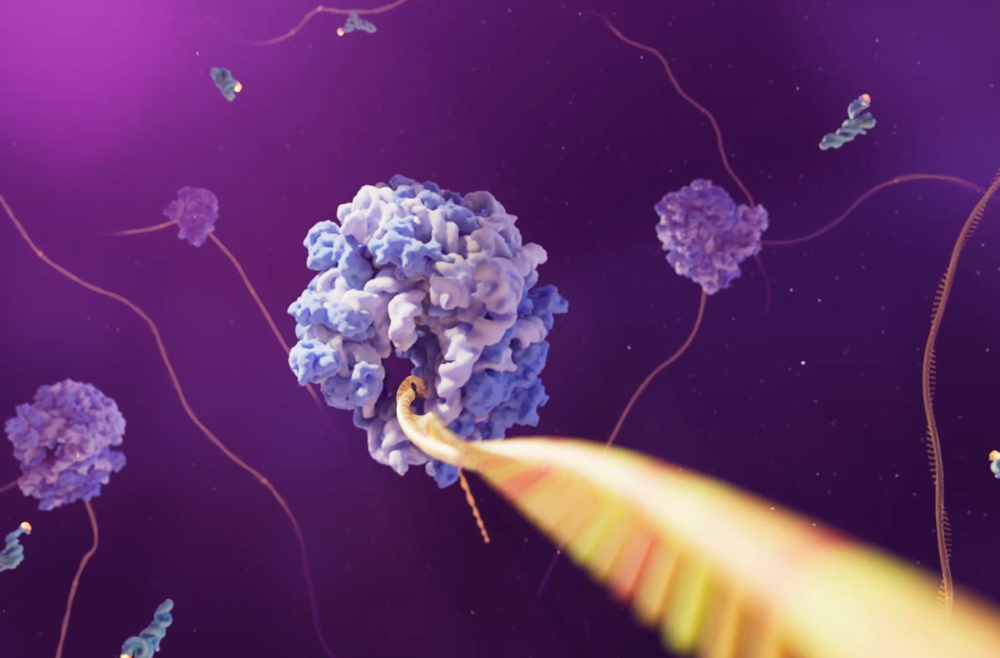PHILADELPHIA— The historic scientific breakthrough at the Perelman School of Medicine at the University of Pennsylvania that helped lead the world’s fight against COVID-19 through mRNA-based vaccines is being commemorated through a non-fungible token—a digital asset to be auctioned by Christie’s—that will support ongoing research at Penn.
The University of Pennsylvania mRNA NFT: Vaccines for a New Era is a one-of-a-kind digital artifact designed by Penn and Drew Weissman, MD, PhD, the Roberts Family Professor in Vaccine Research, who, with scientific collaborator Katalin Karikó, PhD, an adjunct professor of Neurosurgery at Penn and a senior vice president at BioNTech, pioneered the foundational mRNA modification technology that plays a critical role in both the Pfizer/BioNTech and Moderna vaccines for COVID-19 that have impacted billions of people globally.
The NFT features a stunning, one-minute 3D animation of the type of modified mRNA that protects the immune system from SARS-CoV-2 and the platform technology which holds promise for combatting other infectious diseases, as well as immunotherapeutics, cancer treatments, genetic diseases, and more. The video shows mRNA encapsulated inside of lipid nanoparticles, the fat droplets that are the delivery technique Weissman’s lab applied to ensure mRNA reaches the right part of the body to trigger an immune response. The NFT also includes Penn mRNA patent documents and a letter from Weissman, who directs the Penn Institute for RNA Innovation, about the ways in which he and colleagues are leveraging the mRNA technology platform to fight not only coronaviruses but also influenza, herpes, malaria, sickle cell anemia and cancer.
Funds raised by the sale of the NFT—the first digital asset Penn has offered—will further important research across the university.
“The stunning speed with which the mRNA COVID-19 vaccines were developed and their global success in fighting the pandemic has led to an explosion of interest in how modified mRNA technology can be applied across many fields of medicine,” said J. Larry Jameson, MD, PhD, executive vice president of the University of Pennsylvania for the Health System and dean of the Perelman School of Medicine. “Dr. Weissman and his colleagues across Penn are continuing to chart new paths of discovery with the potential for global impact. This digital asset celebrates their historic scientific achievements and points to a bright future in vaccine research and development.”
A non-fungible token, or NFT, is a unit of data stored on a blockchain, which is a database of transactions of digital currencies or assets that are authenticated and tracked. Penn joins a small number of universities to mint NFTs as a way to further support research and education. The development of the NFT celebrating mRNA discoveries was led by the Wharton School’s Stevens Center for Innovation in Finance, which includes a Blockchain Laboratory, in collaboration with Penn Medicine and the Penn Center for Innovation, the university’s hub for technology commercialization and entrepreneurship.
The auction for The University of Pennsylvania mRNA NFT: Vaccines for a New Era will be offered exclusively online by Christie’s between July 15 and July 25. For more information, visit https://www.christies.com/en/auction/the-university-of-pennsylvania-mrna-nft-vaccines-for-a-new-era-21692-nyr/.
Editor’s note: The Pfizer/BioNTech and Moderna COVID-19 mRNA vaccines both use licensed University of Pennsylvania technology. As a result of these licensing relationships, Penn, Dr. Weissman and Dr. Karikó have received, and may continue to receive, significant financial benefits based on the sale of these products. BioNTech also provides ongoing sponsored research funding for Dr. Weissman’s research into the development of infectious disease vaccines.
Penn Medicine is one of the world’s leading academic medical centers, dedicated to the related missions of medical education, biomedical research, and excellence in patient care. Penn Medicine consists of the Raymond and Ruth Perelman School of Medicine at the University of Pennsylvania (founded in 1765 as the nation’s first medical school) and the University of Pennsylvania Health System, which together form a $9.9 billion enterprise.
The Perelman School of Medicine has been ranked among the top medical schools in the United States for more than 20 years, according to U.S. News & World Report’s survey of research-oriented medical schools. The School is consistently among the nation’s top recipients of funding from the National Institutes of Health, with $546 million awarded in the 2021 fiscal year.
The University of Pennsylvania Health System’s patient care facilities include: the Hospital of the University of Pennsylvania and Penn Presbyterian Medical Center—which are recognized as one of the nation’s top “Honor Roll” hospitals by U.S. News & World Report—Chester County Hospital; Lancaster General Health; Penn Medicine Princeton Health; and Pennsylvania Hospital, the nation’s first hospital, founded in 1751. Additional facilities and enterprises include Good Shepherd Penn Partners, Penn Medicine at Home, Lancaster Behavioral Health Hospital, and Princeton House Behavioral Health, among others.
Penn Medicine is powered by a talented and dedicated workforce of more than 47,000 people. The organization also has alliances with top community health systems across both Southeastern Pennsylvania and Southern New Jersey, creating more options for patients no matter where they live.
Penn Medicine is committed to improving lives and health through a variety of community-based programs and activities. In fiscal year 2021, Penn Medicine provided more than $619 million to benefit our community.
Brandon Lausch
C: 215-796-4829
brandon.lausch@pennmedicine.upenn.edu
For Patients and the General Public: 1-800-789-7366
For Media Queries & Requests (24/7): 215-662-2560

